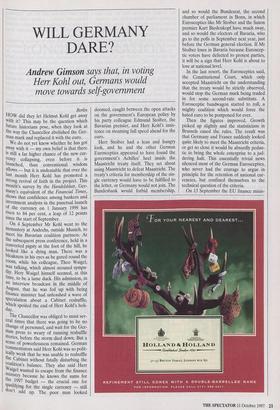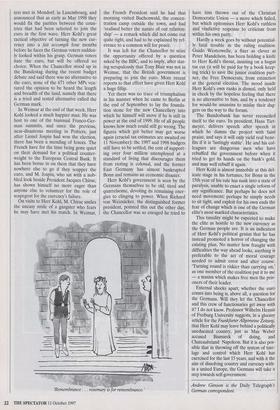WILL GERMANY DARE?
Andrew Gimson says that, in voting
Herr Kohl out, Germans would move towards self-government
Berlin HOW did they let Helmut Kohl get away With it? This may be the question which future historians pose, when they look at the way the Chancellor abolished the Ger- man mark and replaced it with the euro. We do not yet know whether he has got away with it — my own belief is that there is still a far higher chance of the new cur- rency collapsing, even before it is launched, than conventional wisdom allows — but it is undeniable that over the last month Herr Kohl has promoted a strong revival of faith in the project. This month's survey by the Handelsblatt, Ger- many's equivalent of the Financial Times, Shows that confidence among bankers and investment analysts in the punctual launch of the currency on 1 January 1999 has ris. en to 84 per cent, a leap of 12 points since the start of September. On 4 September Mr Kohl went to the Monastery at Andechs, outside Munich, to meet his Bavarian coalition partners. At the subsequent press conference, held in a converted pigsty at the foot of the hill, he looked like a dying man. There was a bleakness in his eyes as he gazed round the room, while his colleague, Theo Waigel, was talking, which almost aroused sympa- thy. Herr Waigel himself seemed, at this tune, to be a lame duck. His admission, in an interview broadcast in the middle of August, that he was fed up with being finance minister had unleashed a wave of speculation about a Cabinet reshuffle, Which spoiled the end of Herr Kohl's holi- day.
The Chancellor was obliged to insist sev- eral times that there was going to be no Change of personnel, and wait for the Ger- Man press to weary of running reshuffle stories, before the storm died down. But a sense of powerlessness remained. German Commentators said Herr Kohl was so polit- ically weak that he was unable to reshuffle the Cabinet without fatally disturbing the coalition's balance. They also said Herr Waigel wanted to escape from the finance ministry because he knows the sums for the 1997 budget — the crucial one for quahfying for the single currency — still don t add up. The poor man looked doomed, caught between the open attacks on the government's European policy by his party colleague Edmund Stoiber, the Bavarian premier, and Herr Kohl's insis- tence on steaming full speed ahead for the euro.
Herr Stoiber had a lean and hungry look, and he and the other German Eurosceptics appeared to have found the government's Achilles' heel inside the Maastricht treaty itself. They set about using Maastricht to defeat Maastricht. The treaty's criteria for membership of the sin- gle currency would have to be fulfilled to the letter, or Germany would not join. The Bundesbank would forbid membership, and so would the Bundesrat, the second chamber of parliament in Bonn, in which Eurosceptics like Mr Stoiber and the Saxon premier Kurt Biedenkopf have much sway, and so would the electors of Bavaria, who go to the polls in September next year, just before the German general election. If Mr Stoiber loses in Bavaria because Euroscep- tic voters have defected to protest parties, it will be a sign that Herr Kohl is about to lose at national level.
In the last resort, the Eurosceptics said, the Constitutional Court, which only accepted Maastricht on the understanding that the treaty would be strictly observed, would stop the German mark being traded in for some second-rate substitute. A Eurosceptic bandwagon started to roll, a mighty coalition which would force the hated euro to be postponed for ever.
Then the figures improved. Growth picked up slightly and the statisticians in Brussels eased the rules. The result was that Germany and France suddenly looked quite likely to meet the Maastricht criteria, or get so close it would be absurdly pedan- tic to bring the whole enterprise to a jud- dering halt. This essentially trivial news silenced most of the German Eurosceptics, who never had the courage to argue in principle for the retention of national cur- rencies, but confined themselves to the technical question of the criteria.
On 13 September the EU finance minis- ters met in Mondorf, in Luxembourg, and announced that as early as May 1998 they would fix the parities between the coun- tries that had been selected to join the euro in the first wave. Herr Kohl's great tactical objective of turning the new cur- rency into a fait accompli four months before he faces the German voters sudden- ly looked within his grasp. German voters hate the euro, but will be offered no choice. When the Chancellor stood up in the Bundestag during the recent budget debate and said there was no alternative to the euro, none of the 671 other MPs ven- tured the opinion to be heard the length and breadth of the land, namely that there is a tried and tested alternative called the German mark.
In Weimar at the end of that week, Herr Kohl looked a much happier man. He was host to one of the biannual Franco-Ger- man summits, and since the previous, near-disastrous meeting in Poitiers, just after Lionel Jospin had won the election, there has been a mending of fences. The French have for the time being gone quiet on their demand for a political counter- weight to the European Central Bank. It has been borne in on them that they have nowhere else to go if they scupper the euro, and M. Jospin, who sat with a nob- bled look beside President Jacques Chirac, has shown himself no more eager than anyone else to volunteer for the role of scapegoat for the currency's failure.
On visits to Herr Kohl, M. Chirac smiles the uneasy smile of a gangster who fears he may have met his match. In Weimar, the French President said he had that morning visited Buchenwald, the concen- tration camp outside the town, and had 'realised better the nature of our relation- ship' — a remark which did not come out quite right, and had to be explained by ref- erence to a common will for peace.
It was left for the Chancellor to seize the opportunity offered by a question asked by the BBC, and to imply, after stat- ing scrupulously that Tony Blair was not in Weimar, that the British government is preparing to join the euro. More recent reports to that effect have given Herr Kohl a huge fillip.
Yet there was no trace of triumphalism in his manner when he came to Berlin at the end of September to lay the founda- tion stone for the new Chancellery into which he himself will move if he is still in power at the end of 1999. He of all people knows how much could still go wrong. The figures which got better may get worse again (crucial tax estimates are awaited on 11 November): the 1997 and 1998 budgets still have to be settled, the cost of support- ing over four million unemployed at a standard of living that discourages them from rioting is colossal, and the former East Germany has almost bankrupted Bonn and remains an economic disaster.
Herr Kohl's government is seen by the Germans themselves to be old, tired and quarrelsome, devoting its remaining ener- gies to clinging to power. When Richard von Weizsacker, the distinguished former president, pointed this out the other day, the Chancellor was so enraged he tried to 'Remembrance. . . rosemary is for remembrance.' have him thrown out of the Christian Democratic Union — a move which failed, but which epitomises Herr Kohl's ruthless and vindictive response to criticism from within his own party.
Hardly a week goes by without potential- ly fatal trouble in the ruling coalition. Guido Westerwelle, a fixer as clever as Peter Mandelson, has been holding a knife to Herr Kohl's throat, insisting on a bogus tax cut (it will be paid for by a book keep- ing trick) to save the junior coalition part- ner, the Free Democrats, from extinction at the general election. The mood inside Herr Kohl's own ranks is dismal, only held in check by the hopeless feeling that there is no alternative to him, and by a tendency for would-be assassins to mislay their dag- gers on the way to the forum.
The Bundesbank has never reconciled itself to the euro. Its president, Hans Tiet- meyer, delivers speech after speech in which he damns the project with faint praise, and says it will only yield real bene- fits if it is 'lastingly stable'. He and his col- leagues are dangerous men who have rebuffed the government before when it tried to get its hands on the bank's gold, and may well rebuff it again.
Herr Kohl is almost immobile at this del- icate stage in his fortunes, for Bonn in the 15th year of his rule has sunk into a state of paralysis, unable to enact a single reform of any significance. But perhaps he does not need movement; perhaps he simply needs to sit tight, and exploit for his own ends the fear of change which is one of the German elite's most marked characteristics.
This timidity might be expected to make the elite as hostile to the new currency as the German people are. It is an indication of Herr Kohl's political genius that he has instead promoted a horror of changing the existing plan. No matter how fraught with difficulties the way ahead looks, anything is preferable to the act of moral courage needed to admit error and alter course. 'Turning round is riskier than carrying on,' as one member of the coalition put it to me — a maxim which makes free men the pris- oners of their leader.
External shocks apart, whether the euro comes into being is, above all, a question for the Germans. Will they let the Chancellor and this crew of functionaries get away with it? I do not know. Professor Wilhelm Hennis of Freiburg University suggests, in a gloomy article for the Frankfurter Allgemeine Zeitung, that Herr Kohl may leave behind a politically uneducated country, just as Max Weber accused Bismarck of doing, and Chateaubriand Napoleon. But it is also pos- sible that in throwing off the system of tute- lage and control which Herr Kohl has exercised for the last 15 years, and with it the aim of dissolving country and currency with- in a united Europe, the Germans will take a step towards self-government.
Andrew Gimson is the Daily Telegraph's German correspondent.



















































































 Previous page
Previous page